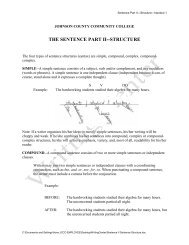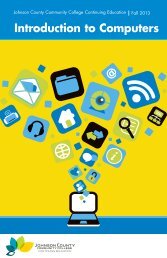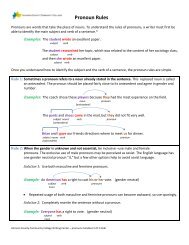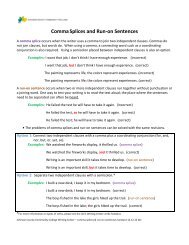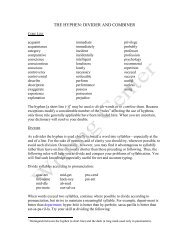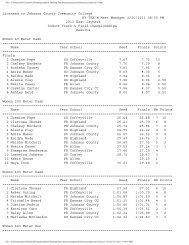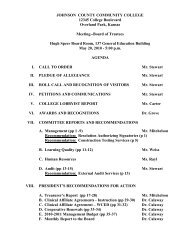League Reaffirmation - Johnson County Community College
League Reaffirmation - Johnson County Community College
League Reaffirmation - Johnson County Community College
You also want an ePaper? Increase the reach of your titles
YUMPU automatically turns print PDFs into web optimized ePapers that Google loves.
A new operational<br />
philosophy<br />
While JCCC has always been deeply committed to<br />
the practices of collegiality, the institution is taking<br />
its methods of operation to a new level.<br />
Shared governance<br />
Most educational institutions practice shared<br />
governance. JCCC is exercising shared governance<br />
more than it ever has. Faculty in particular are<br />
given more opportunities for input into college<br />
decisionmaking. A crosssection of faculty has been<br />
working with administrators to engineer a major<br />
restructuring of the instructional area. In addition,<br />
facultychair positions (not existent before at JCCC)<br />
will be established and a faculty senate created.<br />
For the college as a whole, all students and employees<br />
can offer open and frank comments at the president’s<br />
regular Town Hall meetings.<br />
Continual Quality<br />
Improvement (CQI)<br />
JCCC committed to the principle of CQI in its<br />
operations in 2004 when it joined the Higher<br />
Learning Commission’s Academic Quality Improvement<br />
Project (AQIP). In November 2007, JCCC completed<br />
an institutionwide systems portfolio, which revealed<br />
not only areas of strength where CQI is practiced but<br />
also areas where operations demand improvement.<br />
Because of this reenergized commitment to CQI, the<br />
college is benchmarking activities across campus to<br />
ascertain how student learning may be improved in<br />
the future.<br />
Institutional planning<br />
Beginning March 2007, JCCC mapped out a new<br />
way of institutional planning, calling for the construction<br />
and maintenance of both an annual operational plan,<br />
built by the college’s operational units, and a multiyear<br />
strategic plan developed by crossfunctional teams from<br />
across the campus. More than 100 volunteers sit on six<br />
strategic initiative teams addressing college priorities:<br />
• Increasing graduation rates<br />
• Increasing the percentage of <strong>Johnson</strong> <strong>County</strong><br />
high school graduates who attend JCCC<br />
• Increasing civic engagement activities<br />
• Increasing the percentage of minority students<br />
• Increasing the percentage of minority JCCC<br />
faculty and staff<br />
• Increasing general education learning outcomes<br />
assessment activities<br />
Both the strategic and operational plans flow<br />
into the institutional plan, which then informs the<br />
budget process, ensuring that planning does indeed<br />
precede budgeting.<br />
Data and evidence<br />
Underscoring this new operational philosophy at<br />
JCCC is the notion that data and evidence must be<br />
intimately involved in decisionmaking at all levels.<br />
Data and evidence are necessary to monitor planning<br />
initiatives and to establish the internal benchmarks that<br />
are necessary for CQI. And for shared governance to<br />
be worthwhile, evidence is needed to support and test<br />
new ideas and opinions. Always highly regarded,<br />
JCCC’s Institutional Research department produces<br />
and interprets data for all these efforts and groups.<br />
With these and other initiatives, JCCC intends to serve<br />
as a national model for other community colleges.<br />
69




